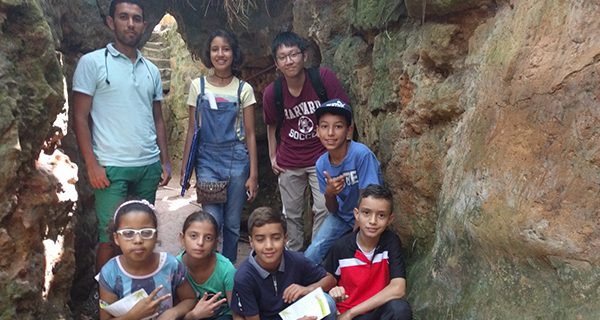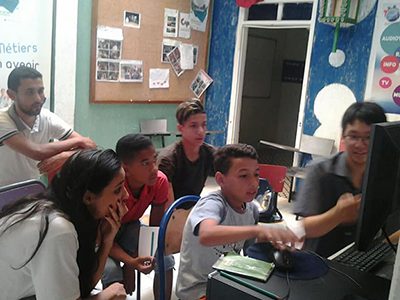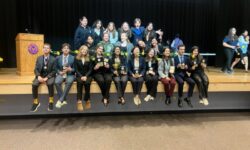[ccfic caption-text format="plaintext"]
By Ethan Lee
Hometown Weekly Correspondent
Part II: Lessons from Moroccan Schools
“Illuminating the Dark Side of the Moon” is a series written by Hometown Weekly Correspondent Ethan Lee, a student at Needham High School. As a reporter, Ethan has focused on revealing truths about misunderstood cultures around the global community. Thus, when Ethan noted absence of positive media about Islam in the news industry in recent years, he decided to learn about Muslim culture and life in Islamic nations for himself. This three-part series relates Ethan’s experiences working with people and schools in Afghanistan and Morocco. In this second article, Ethan describes the lessons he learned while teaching at a school in Morocco.
Learning about Afghanistan’s education system shed new light on the country and its people, and I was curious to learn about education in other misconceived countries. Searching for opportunities, I was especially intrigued by the Northern African nation of Morocco. As a country located in Africa that also had an Islamic majority, Morocco had a culture that was very different to what I knew of, but one that I was very interested in learning about. Additionally, my passion for education was piqued by Morocco’s rich history; for example, the University of al-Qarawiyyin in Morocco is the oldest existing university in the world. Thus, I chose my next journey in a misunderstood culture as an instructor for a community organization in Salé, Morocco.
In my research about Moroccan education, I noted many major mainstream news sources often reported on Morocco’s lack of educational funding and its outdated education system. For example, Al-Jazeera recently published an article describing the negative impacts of Morocco’s present-day education crisis, describing the lack of available schools, supplies, and funds from the government. Other outlets, including Reuters and The Economist magazine, have continuously released pieces that emphasize the country’s poor economic status and lack of effective government. Indeed, many smaller sources of media have accepted this perspective of Morocco and have followed suit by publishing their own criticisms of the country; “unsuccessful,” “inefficient,” and “destroying” are just some words news outlets have used to describe Morocco’s schools. Ultimately, many news sources provided a very negative and disheartening perspective on education in Morocco.
However, as I studied the history of Morocco for myself, I could infer that much of the nation’s culture, diversity and advancements have been neglected in recent media. Although Morocco only gained its independence in 1956, the nation has developed admirably and astonishingly, implementing increasingly progressive ideals in its legislation. The current Moroccan king, Mohammed VI, has granted equal rights in marriage and divorce to women, and has established programs meant to encourage progress in Morocco’s urban areas. Additionally, the Parliament of Morocco has seen vast increases in its number of female legislators, who now make up 17 percent of the governing body. Similarly to what I had discovered about Afghanistan as described in the first part of this article series, Morocco had much more to show for its progress than the negative articles that were circulated by mainstream media.
With this newfound information in mind, I arrived in Morocco prepared to learn more about its culture, as well as its education system. When I first visited the Association Marocaine Pour Le Developpement Local (AMDEL) in Salé, where I would teach, I was surprised by the school’s structure. The association was hosted in an open-air area, and on its second floor was a different household, unrelated to the school. In the rooms that surrounded the open courtyard in the middle of the building were various old-fashioned school equipments; these included older computers, chairs, tables, and writing tools. However, the school also boasted more recent devices and materials, such as cameras, recording microphones, and whiteboards. The school’s simultaneous use of old and new materials was pleasantly surprising, and showed the developments that AMDEL has been making over the course of its history.
After seeing the school’s facilities for the first time, I was faced with what I felt was an enormous challenge–teaching in a country where I could not speak either of its official languages. Additionally, it is often difficult for students to pay attention to or learn from teachers who are speaking in a different language–after all, it usually requires double or triple the focus. However, as I met the students I would teach, I found that attentiveness would not be a problem. There was H (names redacted for privacy reasons), who was extremely interested in building his own website, and asked me numerous questions on how he should make his content. There was N, who loved to learn about photo editing methods, and would spend long periods of time carefully cropping pictures in Photoshop. There was S, an attentive student who would help brainstorm many crucial ideas for building AMDEL’s first website. Essentially, all of the students were incredibly engaged in learning, and would find creative ways to learn from me, despite the language barrier between us. Sometimes, we would spend most of a class typing into Google Translate as both I and my students tried to understand each other; however, my students would always remain bright and positive about our lessons, no matter how difficult it was for them to understand.
The students at AMDEL also found interesting ways to learn about advanced concepts, despite some of the limited technology they had at their disposal. One student, M, was passionate about learning to code but didn’t have access to much of the coding software that other countries’ students can use. So, he used Pascal, a language that is considered more old-fashioned in the US. Another difficulty that presented itself to AMDEL students was the slowness of the facility’s few desktop computers. Instead of being discouraged by this, however, the students would often be crowded around the one high-speed laptop available to them as they worked together on learning about various software.
As I learned more about the organization I was working with, I also learned about the different educational organizations operating in Morocco. Currently, as many popular news outlets report, Morocco is notorious for poor educational systems, and enrollment rates are relatively low. Moroccans I heard from criticized the government for allotting too small a budget to education, while spending too much on other commitments. However, associations like AMDEL are working to provide education to all. The organization focuses on providing education and other services to the community in Salé that it is located in. Additionally, not only do the students at AMDEL learn, but they are given fascinating lessons on setting up TV studios, interviewing others, and making news reports on camera. In fact, AMDEL boasts its own YouTube channel, on which they provide educational videos that are accessible to all Moroccans. Through these activities, AMDEL has worked on giving children in neighboring communities a way to learn about technologies and skill sets that will surely be essential to their futures.
My experience teaching in Morocco showed numerous examples and cases that contrasted with the mainstream media’s negative and downtrodden outlook on the nation’s education. Despite limitations to their learning experiences, students and teachers alike are seeking ways to overcome their obstacles and share the joy of education with all Moroccans. Moreover, I learned just as much, and perhaps even more, about Morocco from the different experiences in the country than I had outside of teaching.
In the next and final piece of “Illuminating the Dark Side of the Moon,” lessons learned from the culture and the people of Morocco will be reported on.
Photos courtesy of AMDEL Facebook page & Ethan Lee
























